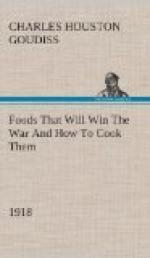Of our men we ask their lives; Of ourselves, a little less food.
SAVE AND SERVE
TO SAVE BREAD. Serve bread or rolls made from corn, rye or from coarse flours. Use breakfast foods and hot cakes, composed of corn, oatmeal, buckwheat, rice or hominy. Serve no toast as garniture or under meat. Serve war breads. Use every part of the bread, either fresh or stale, for puddings and toast; or dried and sifted for baked croquettes; or use to extend flour in the making of muffins and drop cakes.
TO SAVE MEAT. Use more chicken, hare, rabbits, duck, goose, lobster, oysters, clams and egg and cheese dishes of all kinds. Use less beef, mutton, and pork and serve smaller portions at table of these meats. Have fewer of these items on the menu. Provide more entrees and made-over dishes in which a smaller quantity of meat is extended by the use of potatoes, rice, hominy, etc. Use beans, as they contain nearly the same nutritive value as meat. Serve bacon only as a dish and not as a garniture, and this way not more than once a week. Use cheese, dried vegetables and nuts. Use fish and meat chowders. Use meat extension dishes. Serve vegetable dinners.
TO SAVE SUGAR. Use less candy and sweet drinks. Use honey, maple sugar, corn syrup, molasses and dark syrups with hot cakes and waffles and in all cooking, in order to save butter and sugar. Use all classes of fruit preserves, jam, marmalades and jellies. Do not frost or ice cakes. Serve dried fruits with cereals, and no sugar is needed.
TO SAVE FATS. Serve as few fried dishes as possible, so as to save both butter and lard, and in any event use vegetable oils for frying—that is, olive oil, corn oil, cottonseed oil, vegetable oil compounds, etc. Trim all coarse fats from meats before cooking and use the waste fats for shortening and for soap. We are short of soap fats as our supplies of tropical oils used for soap-making are reduced. Do not waste soap. Save fat from soup stock and from boiled meats. Use butter substitutes where possible.
TO SAVE MILK. Use it all. Buy whole milk and let cream rise. Use this cream, and you secure your milk without cost. Economize on milk and cream except for children. Serve buttermilk. Serve cottage cheese regularly in varying forms. It is especially nutritious. Use skimmed milk in cooking. A great quantity of it goes to waste in this country. Use cheese generally. The children must have milk whole, therefore reduce the use of cream.
USE VEGETABLES. Use more vegetables and potatoes. Make fruits and vegetables into salads and attractive dishes. Feature vegetable dinners and salads of all kinds. Encourage the use of cheese with salads. Make all types of salads from vegetables. We have a great surplus of vegetables, and they can be used by substituting them for staples so that the staples most needed will be saved.




